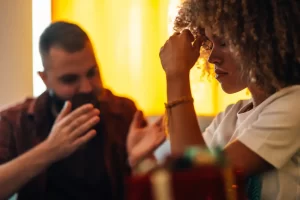
One minute everything feels fine—you’re holding hands, you’re laughing. The next, you’re spiraling: Why didn’t they text back? Did I do something wrong? What if they leave? What if I never feel secure?
Anxiety doesn’t just live in your head—it shows up in how we love, attach, and respond.
If you’ve asked yourself these questions, you’re not alone. Anxiety has a way of hijacking even the healthiest relationships. It doesn’t show up wearing a label, but instead, it shows up in how you argue, how you connect, how you pull away or cling tighter.
When Anxiety Sneaks Into Your Relationship
How anxiety affects relationships is not something you only read about in psychology articles—it’s something you feel in your chest, your gut, and your nervous system.
It starts with questions you might be too ashamed to say out loud:
- Why is this so hard?
- Why am I always walking on eggshells around my partner?
- Why do the smallest things trigger such big fights?
You may have chalked it up to being “too sensitive” or “needy,” but the truth is more nuanced. These questions often arise when anxiety is playing a strong and silent role in the way you relate.
Signs You’re Struggling With Relationship Anxiety
Signs of relationship anxiety aren’t always obvious.
Sometimes, anxiety doesn’t feel like anxiety. It might show up as overanalyzing every word in a text message or needing to hear “I love you” several times a day just to feel okay. Other times, it looks like snapping at your partner for no reason, or suddenly pulling away when things start to feel good.
You might feel like you’re clinging too tightly, or just as often, shutting down completely. These opposing behaviors—clinginess or emotional withdrawal—are both rooted in the same core fear: I won’t be safe if I let myself love fully.
Anxiety doesn’t make you needy or cold. It makes you protective. But when protection starts getting in the way of connection, it’s time to pause and look deeper.
Anxiety affects relationships by creating tension where you want trust, and confusion where you crave clarity.
How Anxiety Affects Relationships (In Real Life)
Anxiety touches both people in a relationship.
The person experiencing anxiety may:
- Seek constant reassurance
- Struggle to trust even when there’s no reason not to
- React emotionally and intensely to minor stressors
- Pull away to avoid conflict or rejection
The non-anxious partner may:
- Feel confused or frustrated
- Begin to walk on eggshells
- Get emotionally drained
- Feel like nothing they do is enough
As a couple, these dynamics can create emotional distance, miscommunication, and cycles of tension. Over time, the relationship can feel unsafe or exhausting—even if the love is still there.
This is how anxiety affects relationships: it doesn’t attack from the outside. It whispers from within, distorting perception, eroding connection, and making safety feel out of reach.
Can Anxiety Ruin A Relationship?
Short answer: Yes—if left unchecked. But it’s not inevitable.
Love requires emotional safety. It needs a space where both partners feel seen, heard, and valued. Anxiety chips away at that safety. It creates second-guessing, doubt, and fear where there could be trust and connection.
That doesn’t make anxiety the villain. It’s a response to fear—often rooted in earlier life experiences like inconsistent caregiving, trauma, or betrayal. But when left unacknowledged, it can fuel patterns that become painful for both partners.
You might see one person withdraw to avoid conflict while the other becomes louder in their need to connect. These push-pull dynamics can create spirals of miscommunication that are hard to break. Emotional overwhelm—sometimes called “flooding”—makes it nearly impossible to listen or respond with empathy. What started as a moment of fear becomes a pattern of disconnection.
This is how anxiety affects relationships: not by attacking love itself, but by distorting it, making it harder to feel safe enough to show up fully.
The good news is that relationships don’t need to be perfect to survive anxiety. They just need awareness, care, and tools. When both partners are willing to slow down, understand what’s happening, and take steps toward healing, even deeply ingrained patterns can shift.
Working with a therapist helps you name these patterns, regulate your emotions, and rebuild safety—from the inside out.
Why Does My Anxiety Keep Ruining Relationships?
If you’ve noticed a pattern—of things starting out well, only to fall apart when you start to care deeply—you’re not alone. Many people struggling with anxiety in relationships ask themselves:
“Every time I get close, I panic.” “I always assume they’re going to leave.” “I sabotage good things before they fall apart.”
These aren’t failures. They’re strategies. Outdated ones, perhaps—but your brain and body adopted them to protect you.
Anxiety, especially in relationships, is often tied to attachment wounds from early life experiences. Anxiety disorders can be influenced by both genetic and environmental factors—including trauma, neglect, and chronic stress. These past experiences shape the way your nervous system responds to closeness, vulnerability, and emotional risk.
So, that fear you feel? It’s real. But it’s also learned. Which means—with support—it can be unlearned.
The work we do at Therapyworks helps clients update their emotional habits. Through consistent, compassionate therapy, you can develop new ways to experience connection—ones that feel safer, steadier, and less ruled by fear.
How To Manage Relationship Anxiety (Without Losing Yourself)
Managing relationship anxiety is about noticing the moment when fear starts to take over and choosing something different—maybe just a breath, or a pause, or saying what’s really going on inside.
It might look like catching yourself mid-spiral and saying, “Okay, I’m scared, but this doesn’t mean they’re leaving.” Or realizing you’re pulling away and asking, “What am I afraid of right now?”
Sometimes, it’s simply learning how to sit with discomfort without needing your partner to fix it. Other times, it’s about leaning in—gently—when every part of you wants to bolt.
This work isn’t always easy. But over time, it creates space. Space to choose connection over reactivity. Space to feel safer in your own skin, not just in the relationship.
How Therapy Can Help You Reclaim Connection
Anxiety can make love feel like a moving target. You want to be close, but you don’t want to get hurt. You crave connection, but you’re scared of what will happen if you fully show up.
Therapy gives you the chance to slow it all down.
To get curious about what’s really happening under the surface. To understand the patterns, not from a place of blame, but from a place of care. And to begin rewriting the story you’ve been telling yourself about what love is—and what you’re allowed to have.
When you start to feel safer inside, everything else begins to shift. Conversations soften. Reactions slow. Connection becomes possible again—not because everything is perfect, but because you’re learning how to stay, even when it’s hard.
Will My Anxiety Ever Go Away?
You may always have a sensitive nervous system. That part might not change. But what can change is how you relate to it—and how it shows up in your most important connections.
Over time, and with the right support, you can begin to shift your responses. Gradually, you move from panic to presence. From fear to connection. From chaos to clarity. And as that happens, something remarkable begins to unfold: your relationships start to feel less like a minefield and more like a place where you can rest.
Because here’s the truth: how anxiety affects relationships doesn’t have to be the end of the story. You can learn to respond rather than react. You can choose connection over protection. And most importantly, you don’t have to figure it all out alone.
If you’re ready to explore how therapy can support your healing, Therapyworks offers both in-person and online sessions. We bring compassion, structure, and a calm, grounded presence to help you navigate whatever you’re facing—with clarity, courage, and care.




